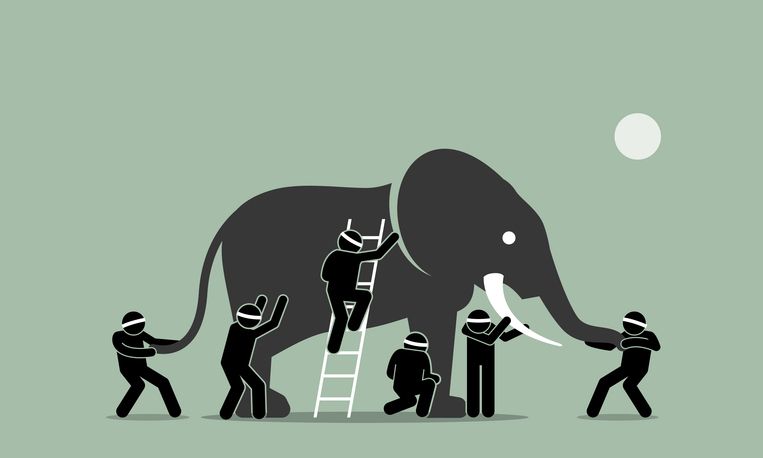This is the youngest you will ever be

I love the parable of an elephant and three blind men. I’m sure you all know it. Each man touches a different part of the elephant and describes it based on his limited perspective. One touches the leg and declares an elephant is like a tree trunk. Another grabs the tail and “knows” an elephant is like a rope. The third holds an ear and says an elephant is like a fan. Each is “right” from their perspective. People argue and fight over what is true. They fail to acknowledge that their individual "truths" are only part of a larger reality. Their truth is not the whole truth. To grasp the whole truth, an integration of different viewpoints, experiences and perceptions helps. When we hold on to a single, narrow view, we are unable to see reality clearly. Being curious and listening to other’s views opens our own vision. For example, someone did something unskillful in the past and you don’t like them. One action does not make the whole person! Do you approach them as if it does? It’s not to condone behavior but perhaps to be willing to open to a different view. Or you meet with friends from the past. Not only do you have different memories of the past – each of you having highlighted a different piece of the event in your minds – but also you hold different expectations of each other in the present. How can you see who is in front of you while holding onto a view of the past? How often do you approach the next moment with true clarity? In Pali, the language used to document the Buddha’s initial teaching, Vipassana means “seeing clearly”. It’s more than just mindfulness or sitting meditation. It is also investigating the true nature of all phenomenon; impermanent, unsatisfactory and not-self. It’s understanding the role that feeling, perception, memory and thought play in coloring reality. And so much more. Ultimately, seeing clearly is often more than just Buddhism. Many other traditions offer different strategies to see the truth. The truth is multi-faceted and the integration of other paths can help deepen wisdom. A daylong meditation retreat offers an opportunity to investigate what might be coloring your view, to name one “elephant” that might be obscuring your sight. At the same time, the retreat space offers time in nature to enjoy the woods, a lake and quiet spaciousness. It offers a time to refresh ourselves and as the mind quiets, we can see more clearly.
Silence is something that comes from your heart, not from outside. Silence doesn’t mean not talking and not doing things; it means that you are not disturbed inside. If you’re truly silent, then no matter what situation you find yourself in, you can enjoy the silence. - Thich Nhat Hanh “Silence is not merely negative – the pause between words, a temporary cessation of speech – but, properly understood, it is highly positive: an attitude of attentive alertness, of vigilance, and above all of listening.” - Archimandrite Kallistos Ware “We need silence, not to escape from ourselves but to know the foundation, the roots, the tendencies of our true nature. There is in us a zone where noise and tumult have no place, and a zone where everything reverberates. When we try to return to the inner, vital zone, it is not to cancel the noise. We do not make use of our moments of collectedness as a retreat. Inner silence is comparable to a light that reveals what is in the shadows, reveals our mechanicality. When we deeply relax, our attention unglues itself little by little from our preoccupations, our identifications. It moves, gropingly, toward the zone of silence… During the experience of inner silence, if thoughts appear, they pass as if upon a screen. Our emotions are short-lived movements that do not carry us toward externals. Our moments of inner openness are linked to the silence.” - Alphonse Osbert “Do not worship silence, but that to which the silence leads.” - Tom Rothschild “Within you, there is a stillness and a sanctuary to which you can retreat at any time and be yourself. - Herman Hesse
ZOOM MEETING 927 6426 7122Password: 038297
ZOOM Meditation
Monday @7pm EDT
Not meeting on the following Mondays:
- Memorial Day
Weekend
- July 4th Weekend
- Labor Day
- From 12/24-1/2

